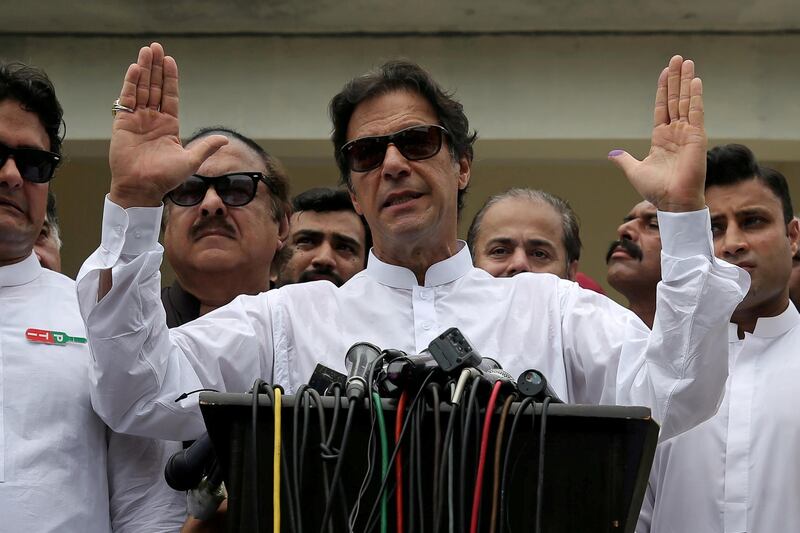The Indian government has snubbed Islamabad’s attempts at reviving peace talks by cancelling a ministerial level meeting and declaring a day of commemoration for the bombing of terrorist targets in Pakistan.
The first month of Imran Khan’s new government in Pakistan seemed to offer promise for improved diplomatic relations with India, until things turned sour this week.
The new prime minister extended an olive branch during his early addresses, indicating a willingness to restart peace talks that were put on hold after the 2016 terrorist attack on the Pathankot Indian air force station. In a letter on September 14, Mr Khan suggested that the foreign ministers of the two countries meet on the sidelines of the UN General Assembly in New York.
Initially the Indian Ministry of External Affairs agreed, clarifying that it would be “a meeting, not a resumption of dialogue”. But they later changed their mind. In a strongly worded statement on Friday, the Indian government announced blamed the cancellation on “two deeply disturbing developments”.
The first was the killing of an Indian Border Security Forces soldier near the border in Jammu and Kashmir on September 18. The slain soldier, Narender Kumar, was killed while on patrol by "unprovoked firing" from Pakistan, reports said. By the time his body was recovered, it had been mutilated.
The second issue was postage stamps issued by Pakistan in July honouring Burhan Wani, a Hizbul Mujahideen militant killed by Indian forces in Kashmir in 2016.
_______
Read more:
Editorial: A glimmer of hope dims in India-Pakistan relations
India v Pakistan in Dubai: India chasing 238 to win Asia Cup clash
Sheikh Mohammed bin Zayed holds talks with Pakistan Prime Minister Imran Khan in Abu Dhabi
_______
India’s statement indicated little hope for reconciliation in the near future. “It is obvious that behind Pakistan’s proposal for talks to make a fresh beginning, the evil agenda of Pakistan stands exposed and the true face of the new Prime Minister of Pakistan Imran Khan has been revealed to the world in his first few months in office,” it read. “Any conversation with Pakistan in such an environment would be meaningless.”
Meanwhile the University Grants Commission of India – a government body – issued directives to universities and education institutes to observe September 29 as Surgical Strike Day to commemorate India's operation against terrorist bases in Pakistan. On that date in 2016, India claimed to have carried out strikes along its border with Pakistan against "terrorist hideouts".
Not everyone in India has joined the bellicose chorus however.
Colonel Danvir Singh Chauhan, an Indian Army veteran, said dialogue with Pakistan remain critical. “Cancelling talks because Pakistanis have killed our BSF soldier and perpetrated activities in Kashmir, is not a right move in my opinion.”
While back-channel talks continue, shunning public dialogue is counterproductive, he said. “India has also conducted strikes on terrorist bases in Pakistan, but they are willing to talk, so why can’t we?” he asked, referring to the strikes of 2016.
The reaction of the Indian Ministry of External Affairs was a response to internal demands, he said. “There is a huge pressure on the government from the domestic constituencies, specifically the nationalist constituencies, who did not approve of these talks.”
India’s ruling party, the populist BJP, have grown increasingly critical of Pakistan as a means of appealing to its populist base. “They are the vote bank and they did not approve, so it was retracted,” said Col Chauhan.
Prime Minister Khan responded to the rejection by calling his Indian counterpart Narendra Modi a “small man”.
“Disappointed at the arrogant & negative response by India to my call for resumption of the peace dialogue,” Mr Khan tweeted on Saturday.
Disappointed at the arrogant & negative response by India to my call for resumption of the peace dialogue. However, all my life I have come across small men occupying big offices who do not have the vision to see the larger picture.
— Imran Khan (@ImranKhanPTI) September 22, 2018
His comments further inflamed BJP supporters. “That tweet proves what we’ve maintained and was unbecoming of anyone who claims to be a serious statesman,” said pro-BJP political analyst Shehzad Poonawala. “Imran Khan is no longer playing sports.”
He continued: “The mask might have changed, but the real face of Pakistan continues to be the deep state actors" – Pakistan's intelligence agency and the army – "which has an India-phobic approach,” he said.
As India turns towards general election next year, more posturing towards Pakistan can be expected. But there is a real risk associated with campaigning on such a nationalist agenda.
“Such a move will hurt the egos of leaders across the border,” Col Chauhan said, “and that will certainly damage any reconciliatory ideas that maybe germinating on the Pakistani side. Our nationalist sentiments could subdue possibilities of peace overtures.”





